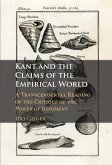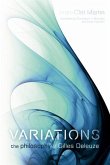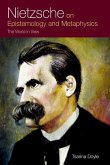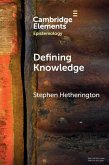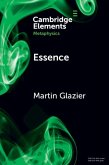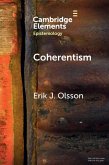Sofie Moller
Kant's Tribunal of Reason (eBook, PDF)
Legal Metaphor and Normativity in the Critique of Pure Reason
29,95 €
29,95 €
inkl. MwSt.
Sofort per Download lieferbar

15 °P sammeln
29,95 €
Als Download kaufen

29,95 €
inkl. MwSt.
Sofort per Download lieferbar

15 °P sammeln
Jetzt verschenken
Alle Infos zum eBook verschenken
29,95 €
inkl. MwSt.
Sofort per Download lieferbar
Alle Infos zum eBook verschenken

15 °P sammeln
Sofie Moller
Kant's Tribunal of Reason (eBook, PDF)
Legal Metaphor and Normativity in the Critique of Pure Reason
- Format: PDF
- Merkliste
- Auf die Merkliste
- Bewerten Bewerten
- Teilen
- Produkt teilen
- Produkterinnerung
- Produkterinnerung

Bitte loggen Sie sich zunächst in Ihr Kundenkonto ein oder registrieren Sie sich bei
bücher.de, um das eBook-Abo tolino select nutzen zu können.
Hier können Sie sich einloggen
Hier können Sie sich einloggen
Sie sind bereits eingeloggt. Klicken Sie auf 2. tolino select Abo, um fortzufahren.

Bitte loggen Sie sich zunächst in Ihr Kundenkonto ein oder registrieren Sie sich bei bücher.de, um das eBook-Abo tolino select nutzen zu können.
This is the first book-length study in English of Kant''s legal metaphors, whose philosophical importance has so far been overlooked.
- Geräte: PC
- mit Kopierschutz
- eBook Hilfe
- Größe: 2.19MB
- FamilySharing(5)
Andere Kunden interessierten sich auch für
![Kant and the Claims of the Empirical World (eBook, PDF) Kant and the Claims of the Empirical World (eBook, PDF)]() Ido GeigerKant and the Claims of the Empirical World (eBook, PDF)24,95 €
Ido GeigerKant and the Claims of the Empirical World (eBook, PDF)24,95 €![Schelling's Naturalism (eBook, PDF) Schelling's Naturalism (eBook, PDF)]() Ben WoodardSchelling's Naturalism (eBook, PDF)0,00 €
Ben WoodardSchelling's Naturalism (eBook, PDF)0,00 €![Variations: The Philosophy of Gilles Deleuze (eBook, PDF) Variations: The Philosophy of Gilles Deleuze (eBook, PDF)]() Jean-Clet MartinVariations: The Philosophy of Gilles Deleuze (eBook, PDF)0,00 €
Jean-Clet MartinVariations: The Philosophy of Gilles Deleuze (eBook, PDF)0,00 €![Nietzsche on Epistemology and Metaphysics (eBook, PDF) Nietzsche on Epistemology and Metaphysics (eBook, PDF)]() Tsarina DoyleNietzsche on Epistemology and Metaphysics (eBook, PDF)0,00 €
Tsarina DoyleNietzsche on Epistemology and Metaphysics (eBook, PDF)0,00 €![Defining Knowledge (eBook, PDF) Defining Knowledge (eBook, PDF)]() Stephen HetheringtonDefining Knowledge (eBook, PDF)16,95 €
Stephen HetheringtonDefining Knowledge (eBook, PDF)16,95 €![Essence (eBook, PDF) Essence (eBook, PDF)]() Martin GlazierEssence (eBook, PDF)16,95 €
Martin GlazierEssence (eBook, PDF)16,95 €![Coherentism (eBook, PDF) Coherentism (eBook, PDF)]() Erik J. OlssonCoherentism (eBook, PDF)16,95 €
Erik J. OlssonCoherentism (eBook, PDF)16,95 €-
-
-
This is the first book-length study in English of Kant''s legal metaphors, whose philosophical importance has so far been overlooked.
Dieser Download kann aus rechtlichen Gründen nur mit Rechnungsadresse in A, B, BG, CY, CZ, D, DK, EW, E, FIN, F, GR, HR, H, IRL, I, LT, L, LR, M, NL, PL, P, R, S, SLO, SK ausgeliefert werden.
Produktdetails
- Produktdetails
- Verlag: Cambridge University Press
- Erscheinungstermin: 5. März 2020
- Englisch
- ISBN-13: 9781108597913
- Artikelnr.: 70908747
- Verlag: Cambridge University Press
- Erscheinungstermin: 5. März 2020
- Englisch
- ISBN-13: 9781108597913
- Artikelnr.: 70908747
- Herstellerkennzeichnung Die Herstellerinformationen sind derzeit nicht verfügbar.
Sofie Møller is a research associate in philosophy at Goethe-Universität Frankfurt Am Main.
Introduction
I.1 The cognitive function of metaphors
I.2 Methodological considerations
I.3 The primacy of practical reason and epistemic normativity
I.4 Outline of the book
1. The critique as the establishment of reason's lawful condition
1.1 The critique as a review of laws
1.2 The natural right tradition and the Naturrecht Feyerabend
1.3 The critique as a lawful solution to conflicts
1.4 Establishing a rightful condition
2. The normativity of law
2.1 Natural right and positive law
2.2 Laws of nature in the natural sciences
2.3 A priori laws as objectively valid rules
2.4 Laws and principles
2.5 The understanding as prescribing laws to nature
3. The transcendental deduction and the tradition of legal deductions
3.1 Quid juris and the transcendental deduction
3.2 The analogy between concepts and property
3.3 The transcendental deduction as a legal deduction tracing an origin
3.4 The tradition of legal deductions
4. The question of fact and the question of law in judicial imputation and in the transcendental deduction
4.1 Quid facti and the tracing of an origin
4.2 Quid facti and the metaphysical deduction
4.3 The question of fact and the question of law in judicial imputation
4.4 The transcendental deduction as judicial imputation
5. The tribunal of reason
5.1 The critique as tribunal
5.2 The Antinomies as a legal trial
5.3 Empirical experience as testimony
5.4 The reader as judge of the critique
5.5 The outcome of the critique as verdict
6. Moral conscience as the practical inner tribunal
6.1 Conscience as an inner tribunal
6.2 Self-deception in moral conscience
6.3 The problem of an erring conscience
6.4 Parallels between moral conscience and the critique of pure reason
7. Distinguishing between rightful claims and groundless pretensions
7.1 Historical background on judicial authority
7.2 Kant on judicial authority
7.3 The judicial office in the legal metaphors
7.4 Authority and validity of judgments and inferences
8. Epistemic authority as both individual and collectively shared
8.1 Decrees as the opposite of verdicts
8.2 Cognitive attitudes
8.3 Epistemic authority and the thinking self
8.4 Political aspects of the critique of pure reason
8.5 The community of cognisers
9. Systematicity and philosophy as the legislation of reason
9.1 Other images of systematicity: the organism and the building
9.2 The legal metaphors as illustrations of systematicity
9.3 Philosophy as the legislation of human reason
9.4 Systematicity in the Appendix to the Transcendental Dialectic
9.5 The critique as the science of the laws of pure reason
Conclusion.
I.1 The cognitive function of metaphors
I.2 Methodological considerations
I.3 The primacy of practical reason and epistemic normativity
I.4 Outline of the book
1. The critique as the establishment of reason's lawful condition
1.1 The critique as a review of laws
1.2 The natural right tradition and the Naturrecht Feyerabend
1.3 The critique as a lawful solution to conflicts
1.4 Establishing a rightful condition
2. The normativity of law
2.1 Natural right and positive law
2.2 Laws of nature in the natural sciences
2.3 A priori laws as objectively valid rules
2.4 Laws and principles
2.5 The understanding as prescribing laws to nature
3. The transcendental deduction and the tradition of legal deductions
3.1 Quid juris and the transcendental deduction
3.2 The analogy between concepts and property
3.3 The transcendental deduction as a legal deduction tracing an origin
3.4 The tradition of legal deductions
4. The question of fact and the question of law in judicial imputation and in the transcendental deduction
4.1 Quid facti and the tracing of an origin
4.2 Quid facti and the metaphysical deduction
4.3 The question of fact and the question of law in judicial imputation
4.4 The transcendental deduction as judicial imputation
5. The tribunal of reason
5.1 The critique as tribunal
5.2 The Antinomies as a legal trial
5.3 Empirical experience as testimony
5.4 The reader as judge of the critique
5.5 The outcome of the critique as verdict
6. Moral conscience as the practical inner tribunal
6.1 Conscience as an inner tribunal
6.2 Self-deception in moral conscience
6.3 The problem of an erring conscience
6.4 Parallels between moral conscience and the critique of pure reason
7. Distinguishing between rightful claims and groundless pretensions
7.1 Historical background on judicial authority
7.2 Kant on judicial authority
7.3 The judicial office in the legal metaphors
7.4 Authority and validity of judgments and inferences
8. Epistemic authority as both individual and collectively shared
8.1 Decrees as the opposite of verdicts
8.2 Cognitive attitudes
8.3 Epistemic authority and the thinking self
8.4 Political aspects of the critique of pure reason
8.5 The community of cognisers
9. Systematicity and philosophy as the legislation of reason
9.1 Other images of systematicity: the organism and the building
9.2 The legal metaphors as illustrations of systematicity
9.3 Philosophy as the legislation of human reason
9.4 Systematicity in the Appendix to the Transcendental Dialectic
9.5 The critique as the science of the laws of pure reason
Conclusion.
Introduction
I.1 The cognitive function of metaphors
I.2 Methodological considerations
I.3 The primacy of practical reason and epistemic normativity
I.4 Outline of the book
1. The critique as the establishment of reason's lawful condition
1.1 The critique as a review of laws
1.2 The natural right tradition and the Naturrecht Feyerabend
1.3 The critique as a lawful solution to conflicts
1.4 Establishing a rightful condition
2. The normativity of law
2.1 Natural right and positive law
2.2 Laws of nature in the natural sciences
2.3 A priori laws as objectively valid rules
2.4 Laws and principles
2.5 The understanding as prescribing laws to nature
3. The transcendental deduction and the tradition of legal deductions
3.1 Quid juris and the transcendental deduction
3.2 The analogy between concepts and property
3.3 The transcendental deduction as a legal deduction tracing an origin
3.4 The tradition of legal deductions
4. The question of fact and the question of law in judicial imputation and in the transcendental deduction
4.1 Quid facti and the tracing of an origin
4.2 Quid facti and the metaphysical deduction
4.3 The question of fact and the question of law in judicial imputation
4.4 The transcendental deduction as judicial imputation
5. The tribunal of reason
5.1 The critique as tribunal
5.2 The Antinomies as a legal trial
5.3 Empirical experience as testimony
5.4 The reader as judge of the critique
5.5 The outcome of the critique as verdict
6. Moral conscience as the practical inner tribunal
6.1 Conscience as an inner tribunal
6.2 Self-deception in moral conscience
6.3 The problem of an erring conscience
6.4 Parallels between moral conscience and the critique of pure reason
7. Distinguishing between rightful claims and groundless pretensions
7.1 Historical background on judicial authority
7.2 Kant on judicial authority
7.3 The judicial office in the legal metaphors
7.4 Authority and validity of judgments and inferences
8. Epistemic authority as both individual and collectively shared
8.1 Decrees as the opposite of verdicts
8.2 Cognitive attitudes
8.3 Epistemic authority and the thinking self
8.4 Political aspects of the critique of pure reason
8.5 The community of cognisers
9. Systematicity and philosophy as the legislation of reason
9.1 Other images of systematicity: the organism and the building
9.2 The legal metaphors as illustrations of systematicity
9.3 Philosophy as the legislation of human reason
9.4 Systematicity in the Appendix to the Transcendental Dialectic
9.5 The critique as the science of the laws of pure reason
Conclusion.
I.1 The cognitive function of metaphors
I.2 Methodological considerations
I.3 The primacy of practical reason and epistemic normativity
I.4 Outline of the book
1. The critique as the establishment of reason's lawful condition
1.1 The critique as a review of laws
1.2 The natural right tradition and the Naturrecht Feyerabend
1.3 The critique as a lawful solution to conflicts
1.4 Establishing a rightful condition
2. The normativity of law
2.1 Natural right and positive law
2.2 Laws of nature in the natural sciences
2.3 A priori laws as objectively valid rules
2.4 Laws and principles
2.5 The understanding as prescribing laws to nature
3. The transcendental deduction and the tradition of legal deductions
3.1 Quid juris and the transcendental deduction
3.2 The analogy between concepts and property
3.3 The transcendental deduction as a legal deduction tracing an origin
3.4 The tradition of legal deductions
4. The question of fact and the question of law in judicial imputation and in the transcendental deduction
4.1 Quid facti and the tracing of an origin
4.2 Quid facti and the metaphysical deduction
4.3 The question of fact and the question of law in judicial imputation
4.4 The transcendental deduction as judicial imputation
5. The tribunal of reason
5.1 The critique as tribunal
5.2 The Antinomies as a legal trial
5.3 Empirical experience as testimony
5.4 The reader as judge of the critique
5.5 The outcome of the critique as verdict
6. Moral conscience as the practical inner tribunal
6.1 Conscience as an inner tribunal
6.2 Self-deception in moral conscience
6.3 The problem of an erring conscience
6.4 Parallels between moral conscience and the critique of pure reason
7. Distinguishing between rightful claims and groundless pretensions
7.1 Historical background on judicial authority
7.2 Kant on judicial authority
7.3 The judicial office in the legal metaphors
7.4 Authority and validity of judgments and inferences
8. Epistemic authority as both individual and collectively shared
8.1 Decrees as the opposite of verdicts
8.2 Cognitive attitudes
8.3 Epistemic authority and the thinking self
8.4 Political aspects of the critique of pure reason
8.5 The community of cognisers
9. Systematicity and philosophy as the legislation of reason
9.1 Other images of systematicity: the organism and the building
9.2 The legal metaphors as illustrations of systematicity
9.3 Philosophy as the legislation of human reason
9.4 Systematicity in the Appendix to the Transcendental Dialectic
9.5 The critique as the science of the laws of pure reason
Conclusion.

